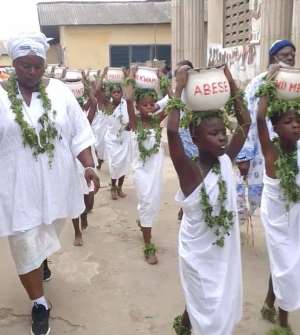
The Chief and people of the Abese La Adonten Division on Sunday, July 13, performed the Sacred Water Fetching Rites, officially marking the beginning of this year’s Afrimi Yele Yeli (Afrimi Yam Festival).
The culturally rich ceremony drew a large crowd of residents from the La township, surrounding villages, and well-wishers, who gathered at the forecourt of the Abese La Adonten Palace to witness the solemn yet vibrant traditions of the Abese people, carried out with dignity and ancestral pride.
At the heart of the rites was a sacred procession to the revered Jubilee Stream. Young virgins—both boys and girls—were carefully selected to undertake this spiritual journey, symbolizing purity and renewal. Adorned in white cloth and draped with medicinal herbs around their necks, the children moved in rhythmic reverence to traditional drumming, chants, and war songs that reflected the spiritual strength and resilience of the community.
The children fetched the holy water three times, as custom demands. This act represents spiritual cleansing, a renewal of ancestral blessings, and a declaration of readiness to proceed with the festival’s activities in honour of the Afrimi Deity.
Upon their return to the palace, the Chief and elders were formally informed of the safe completion of the rites. After confirming there were no casualties, they offered solemn prayers to God and the Ancestors, thanking them for protection and guidance.
The Abese La Adonten Division, a principal clan of La, is renowned for its cultural pride and deep-rooted traditions. The Afrimi Yele Yeli Festival is the first in a series of sacred observances that culminate in the grand Homowo Festival. Deeply spiritual, the festival reflects the Ga calendar and affirms the La people’s commitment to preserving their cultural and ancestral heritage.
Beyond ritual, the festival is a sacred time of reflection, thanksgiving, and invocation—a spiritual period to seek divine favour and protection for the future. Under the leadership of Nii Kwade Okropong I, the rites continue to symbolize clan identity, continuity, and collective strength.
Sprinkling of Otor (Mashed Yam Mixed with Red Oil)
In the early hours of Tuesday, the Chief of Abese La Adonten Division, accompanied by elders and Asafo groups, visited shrines and households across La township to perform the traditional sprinkling of Otor. This sacred offering honours the lesser deities and ancestral spirits, reaffirming their role in the spiritual welfare of the community.
Durbar of Chiefs and Public Address
Later in the afternoon, a durbar was held at the forecourt of Kwakwranya We, where Nii Kwade Okropong I, flanked by his elders and representatives from other La clans, addressed the gathering. In a message directed especially to the youth, the Chief urged them to avoid drugs and substance abuse.
This message reflected the festival’s 2025 theme: Empowering Ghanaian Youth: Breaking the Chains of Drug Abuse through Cultural Heritage and Community Support.
Welcoming of the Afrimi War Deity
At around 5:00 PM, the Chief, elders, and guests assembled to welcome the return of the Afrimi War Deity to the La township. The homecoming was marked with libation pouring and other traditional rites, honouring the deity and invoking its blessings.
These sacred rituals are not mere ceremonies but essential spiritual cornerstones leading up to the Homowo Festival. They serve to renew divine favour, honour ancestors, and fortify the cultural and spiritual identity of the La people.


